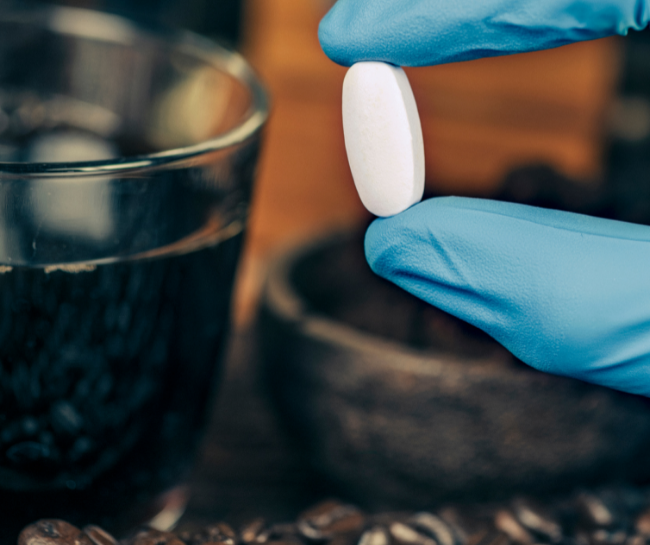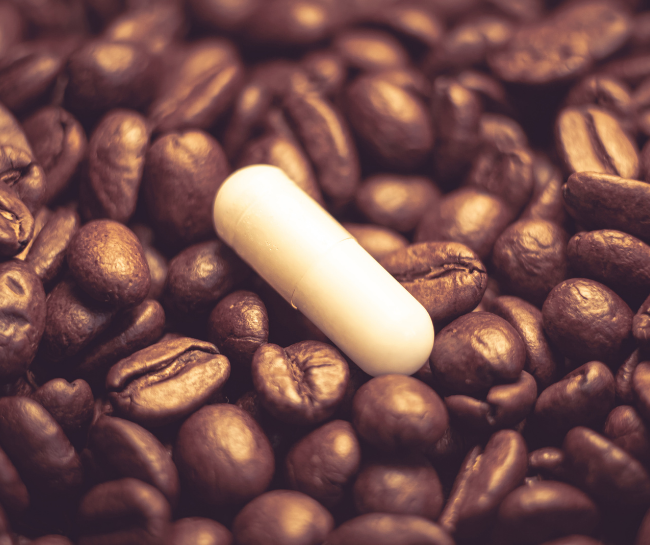Caffeine pills may be used to fight daytime sleepiness, keep you moving at work, or help you remain alert when studying for exams.
Like drinking a coffee, taking caffeine pills can make you stay awake, temporarily increase attention, memory, and energy.
While caffeine pills may aid in studying or staying awake, high doses of caffeine may cause adverse effects and may not be suitable for everyone.
Continue reading, and here’s what you should know about caffeine pills to keep you stay awake.
What are caffeine pills

Caffeine is a stimulant drug that stimulates central nervous system activity. Caffeine is naturally found in tea and coffee, and producers add caffeine to other items such as energy bars and energy drinks.
In addition, a caffeine pill may include either synthetic or natural caffeine.
The caffeine pills vary depending on the brand. Each pill contains 100 to 200 milligrams (mg) in many circumstances. This amount is more than in most cups of coffee but lower than in other energy drinks.
Can caffeine pills keep you awake
Caffeine pills do keep you awake. As most people know, caffeine is a stimulant that works on the central nervous system, including the spinal cord, brain, and nerves, to help you feel more alert and awake.
Are caffeine pills as good as coffee

None is superior to the other since they both provide advantages to an individual. Caffeine pills may become addictive if you grow accustomed to their potency, and since they are so easy to take, you should be mindful of how much you take each day.
How long do caffeine pills take to work
Caffeine pills might take up to an hour to completely absorb and take action in the bloodstream. Depending on body composition, it might take anywhere between 3 and 12 hours for the body to digest half of the caffeine present.
Can I take caffeine pills on an empty stomach
These pills may be taken with or without food. Take these with meals if it affects your stomach. Take these pills regularly. Do not take your pills more often than prescribed.

Moreover, consult your physician about the use of this medication in children. Special care may be needed. This pill is not recommended for use in children under the age of 12.
Should I take caffeine pills before a workout
Caffeine pills should often be given 30 to 60 minutes before exercise.
☕Caffeine acts rapidly, so your morning cup of coffee won’t last long enough to support your noon or after-work sweat session.
Additionally, caffeine supplements improve concentration, perceived effort, and athletic ability. They also improve focus, which allows you to get the most out of your exercise. Furthermore, caffeine pills are an excellent alternative to energy beverages like coffee before exercise.
How much caffeine is too much
Healthy persons should not use caffeine in excess of 400 milligrams (mg) per day. That’s around ten cans of cola or four 8-ounce cups of brewed coffee.
Also, teens should consume no more than 100 mg of caffeine per day (about two cans of cola or one 8-ounce cup).
What are the side effects of stay awake pills

Caffeine may be dangerous, mainly if used in high amounts or by caffeine-sensitive individuals. Among these effects are:
- Dizziness
- Diarrhea
- Nervousness and anxiety
- Headache
- Fast heart rate
- A feeling of unhappiness (dysphoria)
- Nausea
- High blood pressure
- Heartburn
- Thirst
- Sleep problems
- Shaking
Caffeine overdose may occur when used in large quantities. Among the symptoms are:
- Seizures
- Feeling disorientated
- Irregular and rapid heartbeat
- Vomiting
Benefits of caffeine pills

Caffeine may be helpful to one’s health. However, most caffeine research focuses on the effects of the caffeine found in coffee.
As a result, scientists often struggle to distinguish the advantages of caffeine from the benefits of other chemicals in coffee, such as antioxidants.
Caffeine may have the following benefits:
- Migraine and headache relief
Caffeine may help with tension headaches and migraines, potentially reducing pain perception. The FDA has licensed caffeine for usage with pain medications to treat migraine headaches. Midol and Excedrin are two migraine medicines that include caffeine. According to the American Migraine Foundation, caffeine should be limited to no more than two days a week for headache treatment.
- Improved athletic performance
The National Collegiate Athletic Association (NCAA) has banned caffeine usage before events, which means competitors cannot consume a small quantity at the correct time. A positive urine drug test may be determined by taking 500 mg — or 6 to 8 cups of brewed coffee — between 2 and 3 hours before a competition.
- Increased focus and memory
Caffeine is a popular supplement for increasing alertness and focus when working or studying. For these reasons, research backs up its efficacy.
A 2014 research looked at the impact of caffeine pills containing 200 mg on memory in 160 individuals.
The researchers discovered that individuals who took caffeine pills while doing a learning activity performed better on memory tests 24 hours later than those who took a placebo.
Read one of our blogs about placebo. Click Am I Protected During Inactive Pills?

